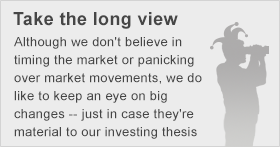
The Dow Jones Industrial Average (DJINDICES: ^DJI) was down 168 points, to 16,172, at 1:30 p.m. EDT after Chinese economic results showed the nation's economy slowed more than expected in the start of the year. Twenty-seven of the 30 blue-chip stocks were in the red. The S&P 500 (SNPINDEX: ^GSPC) was down 15 points to 1,852.
The market is focused on the two Chinese economic releases despite four mixed U.S. economic releases.
|
Report |
Period |
Result |
Previous |
|---|---|---|---|
|
Chinese Retail Sales Y-o-Y |
Jan/Feb |
11.8% |
13.6% |
|
Chinese Industrial Production Y-o-Y |
Jan/Feb |
8.6% |
9.7% |
|
U.S. weekly new unemployment claims |
3/1-3/8 |
315,000 |
324,000 |
|
U.S. retail sales |
February |
0.3% |
-0.6% |
|
U.S. retail sales ex-automobiles |
February |
0.3% |
-0.3% |
|
Import Price Index |
February |
0.9% |
0.4% |
|
Business Inventories |
January |
0.4% |
0.5% |
The two to pay attention are the Chinese releases which cover both January and February to account for the distortion of the Chinese New Year. Chinese retail sales grew 11.8% year over year, down from December's 13.5% growth and below economist expectations of 13.5% year-over-year growth. Chinese industrial production showed 8.6% growth year over year, down from 9.7% in December and below economist expectations of 9.5% growth. Economically sensitive Brent crude oil fell 0.5% to $107.5 while West Texas Intermediate crude was unchanged at $98.09.
The Chinese economy has been one of the main drivers of world economic growth the past decade. A slowdown in the Asian power is worrisome as China has built up a massive amount of debt since the U.S. financial crisis in 2007, causing many to worry that the nation is experiencing a credit bubble. The main question on investors' minds has been how the Communist Party would address the situation.
Until earlier this month, China has never had a company default on its domestically issued bonds. Shanghai Chaori Solar Energy became the first. Previously, companies have always been bailed out by the government or other parties. This created the impression in many investors' minds that the Communist Party would never allow investors to not be paid back on their credit investments, allowing risky lending to expand. As the Chinese economy slows and more companies fail, China will have to bail them out or let them fail, risking investor apathy in an economy that has been fairly tightly controlled.
What does this mean for U.S. investors?
China slowing is bad for U.S. companies that are making more of their profits abroad than ever before. This, combined with how the U.S. stock market has looked overvalued for some time, has led me to suggest it's a good time to build up some cash so you are able to invest when opportunities arise.
The Motley Fool has always taught that Foolish (capital "F") investors don't invest in the broad market. We invest in great companies at good prices, continue to educate ourselves, and hold on to our great companies over the long term.